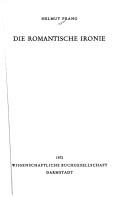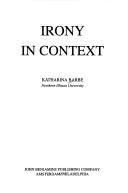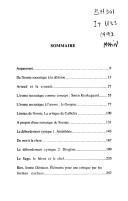| Listing 1 - 10 of 58 | << page >> |
Sort by
|
Book
ISBN: 9780060898779 Year: 2009 Publisher: New York, NY Stately Plump Buck Mulligan, LLC / HarperCollins Publishers
Abstract | Keywords | Export | Availability | Bookmark
 Loading...
Loading...Choose an application
- Reference Manager
- EndNote
- RefWorks (Direct export to RefWorks)
apocalypse --- survival --- sarcasm --- survivalism
Book

ISBN: 3110562251 9783110563252 3110563258 9783110563283 3110563282 9783110562255 9783110562118 3110562111 Year: 2018 Publisher: Berlin Boston
Abstract | Keywords | Export | Availability | Bookmark
 Loading...
Loading...Choose an application
- Reference Manager
- EndNote
- RefWorks (Direct export to RefWorks)
The rhetorical trope of irony is well-trod territory, with books and essays devoted to its use by a wide range of medieval and Renaissance writers, from the Beowulf-poet and Chaucer to Boccaccio and Shakespeare; however, the use of sarcasm, the "flesh tearing" form of irony, in the same literature has seldom been studied at length or in depth. Sarcasm is notoriously difficult to pick out in a written text, since it relies so much on tone of voice and context. This is the first book-length study of medieval and Renaissance sarcasm. Its fourteen essays treat instances in a range of genres, both sacred and secular, and of cultures from Anglo-Saxon to Arabic, where the combination of circumstance and word choice makes it absolutely clear that the speaker, whether a character or a narrator, is being sarcastic. Essays address, among other things, the clues writers give that sarcasm is at work, how it conforms to or deviates from contemporary rhetorical theories, what role it plays in building character or theme, and how sarcasm conforms to the Christian milieu of medieval Europe, and beyond to medieval Arabic literature. The collection thus illuminates a half-hidden but surprisingly common early literary technique for modern readers.
Irony in literature. --- Literature, Medieval --- Literature, Modern --- History and criticism. --- Irony. --- Sarcasm --- Cynicism --- Rhetoric --- Satire --- Tragic, The --- Understatement --- Sarcasm. --- early modern. --- irony. --- medieval.
Book
ISBN: 0674063147 9780674063143 9780674061453 0674061454 0674255194 9780674255197 0674416880 Year: 2011 Publisher: Cambridge, MA
Abstract | Keywords | Export | Availability | Bookmark
 Loading...
Loading...Choose an application
- Reference Manager
- EndNote
- RefWorks (Direct export to RefWorks)
In 2001, Vanity Fair declared that the Age of Irony was over. Joan Didion has lamented that the United States in the era of Barack Obama has become an ";irony-free zone."; Jonathan Lear in his 2006 book Radical Hope looked into America's heart to ask how might we dispose ourselves if we came to feel our way of life was coming to an end. Here, he mobilizes a squad of philosophers and a psychoanalyst to once again forge a radical way forward, by arguing that no genuinely human life is possible without irony.Becoming human should not be taken for granted, Lear writes. It is something we accomplish, something we get the hang of, and like Kierkegaard and Plato, Lear claims that irony is one of the essential tools we use to do this. For Lear and the participants in his Socratic dialogue, irony is not about being cool and detached like a player in a Woody Allen film. That, as Johannes Climacus, one of Kierkegaard's pseudonymous authors, puts it, "is something only assistant professors assume." Instead, it is a renewed commitment to living seriously, to experiencing every disruption that shakes us out of our habitual ways of tuning out of life, with all its vicissitudes. While many over the centuries have argued differently, Lear claims that our feelings and desires tend toward order, a structure that irony shakes us into seeing. Lear's exchanges with his interlocutors strengthen his claims, while his experiences as a practicing psychoanalyst bring an emotionally gripping dimension to what is at stake-the psychic costs and benefits of living with irony.
Irony. --- Cynicism. --- Pessimism --- Philosophy --- Psychology --- Skepticism --- Sarcasm --- Cynicism --- Rhetoric --- Satire --- Tragic, The --- Understatement --- Irony

ISBN: 3534054040 9783534054046 Year: 1972 Volume: 12 Publisher: Darmstadt: Wissenschaftliche Buchgesellschaft,
Abstract | Keywords | Export | Availability | Bookmark
 Loading...
Loading...Choose an application
- Reference Manager
- EndNote
- RefWorks (Direct export to RefWorks)
Irony. --- Irony --- German literature --- Thematology --- anno 1800-1899 --- Romanticism --- Sarcasm --- Cynicism --- Rhetoric --- Satire --- Tragic, The --- Understatement --- Romantisme --- Ironie --- Romanticism - Germany
Book
ISBN: 3110424606 3110424428 9783110424423 9783110424430 3110424436 3110302209 3110424436 9783110424607 9783110302202 Year: 2015 Publisher: De Gruyter
Abstract | Keywords | Export | Availability | Bookmark
 Loading...
Loading...Choose an application
- Reference Manager
- EndNote
- RefWorks (Direct export to RefWorks)
The logic of modernity is an ironical logic. Modern irony, a flash of genius produced by Romantic theorists, is first discussed, e.g. in Hegel and Kierkegaard, as an ethical problem personified in figures such as the aesthete, the seducer, the flaneur, or the dandy. It fully develops in the novel, the modern genre par excellence: in novels of the early 19th century no less than in those of postmodernity or in those of the masters of citation, parody, and pastiche of classical modernism (Musil, Joyce, and Proust). This book, however, goes one step further. Looking at how such different authors as Schmitt, Kafka, and Rorty identify the political conflicts, contradictions, and paradoxes of the 20th century as ironical and offers a comprehensive account of the constitutive irony of modernity's ethical, poetical, and political logic.
Irony in literature. --- Irony. --- Modernism (Literature) --- Crepuscolarismo --- Literary movements --- Sarcasm --- Cynicism --- Rhetoric --- Satire --- Tragic, The --- Understatement --- modernity. --- poetics. --- politics.

ISBN: 9027250464 1556193270 9027282706 1283222078 9786613222077 9789027282705 9789027250469 9781556193279 Year: 1995 Volume: n.s., 34 Publisher: Amsterdam : Benjamins,
Abstract | Keywords | Export | Availability | Bookmark
 Loading...
Loading...Choose an application
- Reference Manager
- EndNote
- RefWorks (Direct export to RefWorks)
In her book, Barbe discusses verbal irony as an interpretative notion. Verbal irony is described in its various realizations and thus placed within linguistics and pragmatics. From the point of view of an analyzing observer, Barbe provides an eclectic approach to irony in context, a study of how conversational irony works, and how it compares with other concepts in which it plays a role. In addition, by means of the analysis of irony as an integrated pervasive feature of language, Barbe questions some basic unstated, literacy and culture-dependent assumptions about language. Her study of irony
Literary semiotics --- Pragmatics --- Irony in literature --- Irony in literature. --- Irony. --- Irony --- Ironie --- Ironie dans la littérature --- Sarcasm --- Cynicism --- Rhetoric --- Satire --- Tragic, The --- Understatement --- Ironie dans la litterature
Book
ISBN: 9780262357296 0262357291 9780262538268 0262538261 Year: 2020 Publisher: Cambridge (Mass.) MIT Press
Abstract | Keywords | Export | Availability | Bookmark
 Loading...
Loading...Choose an application
- Reference Manager
- EndNote
- RefWorks (Direct export to RefWorks)
"This book provides a concise summary of the concepts "irony" and "sarcasm": what they mean, how they have been used over time, and how they differ from the related concepts like coincidence, paradox, satire, and parody. The use of these terms, from Greek philosophers to postmodern theorists, is briefly sketched, and empirical research on why people use such language, and how it is comprehended, is provided. The book is leavened with quotations about irony and sarcasm, examples from popular culture (including an analysis of Alanis Morissette's song "Ironic"), television programs, and the use of irony and sarcasm online, both in words and also via emoticons, emoji, hashtags, and internet memes. The book is unique in that it provides a succinct yet comprehensive overview of the history of these terms, as well as empirical research by cognitive scientists. It will provide careful writers with the background and context that is necessary to employ these terms with confidence, or to use other terms if they are more appropriate"--
Irony --- Semantics --- Formal semantics --- Semasiology --- Semiology (Semantics) --- Comparative linguistics --- Information theory --- Language and languages --- Lexicology --- Meaning (Psychology) --- Sarcasm --- Cynicism --- Rhetoric --- Satire --- Tragic, The --- Understatement
Book
ISBN: 1009234536 1009234579 1009234560 1009234544 9781009234535 9781009234573 9781009234566 Year: 2023 Publisher: Cambridge : Cambridge University Press,
Abstract | Keywords | Export | Availability | Bookmark
 Loading...
Loading...Choose an application
- Reference Manager
- EndNote
- RefWorks (Direct export to RefWorks)
This text reviews the foundational definitions, theories, and psycholinguistic models of ironic language, covering key questions such as the distinction between literal and ironic meaning, the role of contextual information during irony processing, and the cognitive mechanisms involved.
Irony. --- Psycholinguistics. --- Language, Psychology of --- Language and languages --- Psychology of language --- Speech --- Linguistics --- Psychology --- Thought and thinking --- Sarcasm --- Cynicism --- Rhetoric --- Satire --- Tragic, The --- Understatement --- Psychological aspects
Book
ISBN: 0416328601 Year: 1982 Publisher: London
Abstract | Keywords | Export | Availability | Bookmark
 Loading...
Loading...Choose an application
- Reference Manager
- EndNote
- RefWorks (Direct export to RefWorks)
Literature --- 82-7 --- #SBIB:309H516 --- Humor. Satire --- Verbale communicatie: retoriek --- 82-7 Humor. Satire --- Irony --- Irony in literature --- Sarcasm --- Cynicism --- Rhetoric --- Satire --- Tragic, The --- Understatement --- 82-7 Prose satire. Humour, epigram, parody etc. --- Prose satire. Humour, epigram, parody etc. --- Ironie

ISBN: 2251604847 9782251604848 Year: 1993 Volume: 5 484 Publisher: Paris : Belles Lettres,
Abstract | Keywords | Export | Availability | Bookmark
 Loading...
Loading...Choose an application
- Reference Manager
- EndNote
- RefWorks (Direct export to RefWorks)
Cynicism --- Irony --- Philosophy, Ancient --- Philosophie ancienne --- History --- Philosophy, Ancient. --- History. --- -Irony --- -Philosophy, Ancient --- Ancient philosophy --- Greek philosophy --- Philosophy, Greek --- Philosophy, Roman --- Roman philosophy --- Sarcasm --- Rhetoric --- Satire --- Tragic, The --- Understatement --- Pessimism --- Philosophy --- Psychology --- Skepticism --- Irony - History. --- Cynicism - History. --- Cynisme
| Listing 1 - 10 of 58 | << page >> |
Sort by
|

 Search
Search Feedback
Feedback About UniCat
About UniCat  Help
Help News
News